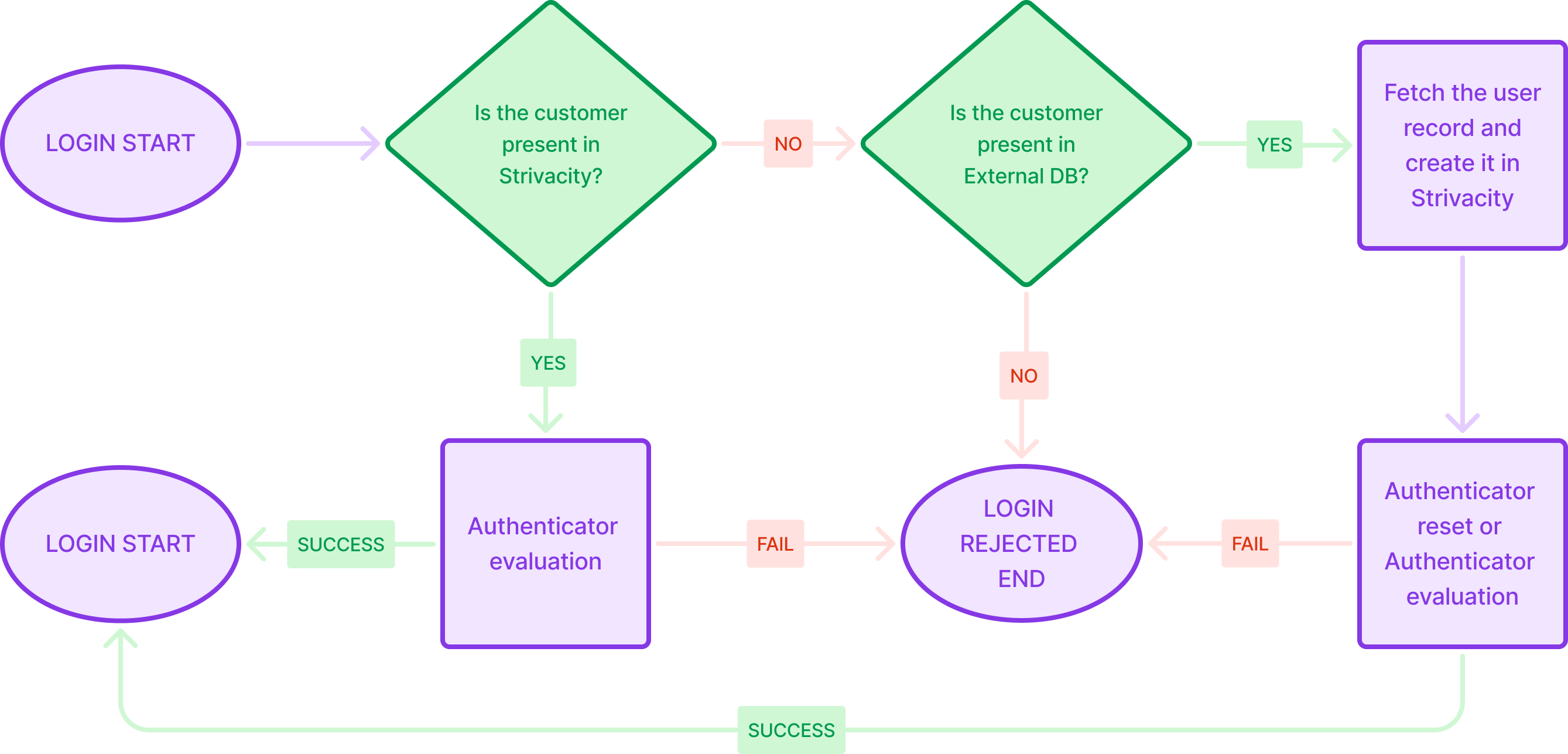Customer migration
Strivacity offers robust support for migrating customers from external applications through custom database connections and the Strivacity API. This flexible and efficient approach ensures seamless integration and transition of customer data from various external systems into the Strivacity platform, enhancing the overall user experience.
We recommend two different approaches to customer migration: Just-in-time migration and Bulk import migration.
Just-in-time (JIT) migration
Just-in-time migration occurs when a customer logs in for the first time after switching over to Strivacity as the identity provider. During this login attempt, the customer's data, including credentials, is verified against the old system and then transferred to Strivacity's database. This approach ensures customers continue with their usual login process without needing to reset passwords or create a new identifier.
- Pros:
- Seamless for customers: customers log in as usual without password resets
- Minimal downtime: no need for extensive downtime during migration.
- Gradual transition: data is migrated gradually, reducing the risk of errors.
- Cons:
- Initial login lag: first login might be slower due to real-time data transfer.
- Ongoing database access: requires maintaining the old database until all users have logged in.

Customer login flow with just-in-time migration
Bulk import
Bulk import involves transferring all user data from the external database to Strivacity in a single operation. This method is suitable for organizations looking to migrate large datasets quickly and efficiently, allowing for a one-time, comprehensive transfer of customer information. Bulk migration can also be used to finish a JIT migration when all of the customers have not yet logged into Strivacity.
- Pros:
- Efficient for large data: suitable for transferring large volumes of data at once.
- Single operation: simplifies the migration process by consolidating it into one event.
- Post-migration independence: eliminates dependency on the old database once the migration is complete.
- Cons:
- Customer disruption: customers often need to reset passwords, potentially leading to increased support requests.
- Risk of errors: initial data transfer errors can impact all customers.
Strivacity's support for APIs ensures a flexible and integrated migration process, making both just-in-time migration and bulk import viable options depending on the organization's specific needs and constraints.
Supported password hashes
Strivacity's default password hashing algorithm is SHA256 Salted
During the migration process, Strivacity supports the following password hashing algorithms to ensure compatibility and secure handling of customer credentials:
| Hash algorithm | Security level | Description |
|---|---|---|
| Argon2 | High | PHC winner, memory-intensive for enhanced security. |
| BCrypt | High | Built-in salt, strong algorithm, adjustable work factor. |
| Drupal-compatible SHA512 | High | Used with salt plus multiple iterations; only stores the first 55 characters from the hash for stronger password security. |
| SHA256Salted | Medium (with salt) | SHA-256 with a salt improves resistance to rainbow table attacks but lacks built-in work factor or memory-hard features. |
| AspDotNet | Medium | Uses PBKDF2 with configurable iterations and salt; security depends on configuration. |
| SHA1Salted | Low-Medium | SHA-1 with salt adds some protection, but SHA-1 should be avoided due to collision vulnerabilities. |
| SHA256 | Low | SHA-256 without salt; fast and vulnerable to precomputed hash and rainbow table attacks. |
| SHA1 | Low | SHA-1 is considered insecure due to known collision attacks and should be avoided. |
| MD5Salted | Low | MD5 with salt slightly improves over plain MD5, but MD5 should be avoided due to collision vulnerabilities. |
Ensure that customer passwords are migrated in one of these formats for seamless integration and authentication post-migration.
Note: while Plaintext password imports are also supported this is not advised.
Updated 11 months ago
